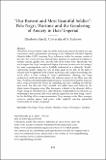Files in this item
"Our bravest and most beautiful soldier" : Pola Negri, wartime, and the gendering of anxiety in Hotel Imperial
Item metadata
| dc.contributor.author | Girelli, Elisabetta | |
| dc.date.accessioned | 2019-05-23T12:34:42Z | |
| dc.date.available | 2019-05-23T12:34:42Z | |
| dc.date.issued | 2019-06 | |
| dc.identifier | 255620661 | |
| dc.identifier | 83585c1b-956c-4e5b-be59-1950f32eed62 | |
| dc.identifier | 85066624917 | |
| dc.identifier | 000468633000004 | |
| dc.identifier.citation | Girelli , E 2019 , ' "Our bravest and most beautiful soldier" : Pola Negri, wartime, and the gendering of anxiety in Hotel Imperial ' , Film-Philosophy , vol. 23 , no. 2 , pp. 159-176 . https://doi.org/10.3366/film.2019.0107 | en |
| dc.identifier.issn | 1466-4615 | |
| dc.identifier.uri | https://hdl.handle.net/10023/17747 | |
| dc.description.abstract | This article focuses on Pola Negri, one of the most iconic stars of the silent era, and concentrates on her performance and image in the Hollywood film Hotel Imperial (Mauritz Stiller, 1927). Assessing Negri's character within the wartime context of the plot, her screen presence and narrative function are analysed in relation to wartime anxiety, gender roles, and the role of the home front. Specifically, this article argues that Negri's exceptional display of anxiety, in contrast to the acting of her male co-protagonists, can be fruitfully understood as a distinctly “female”, empowering quality, aiding her role of main agent in the film. In the light of selected texts by Sigmund Freud, Charles Bachelard, and Lindsey Stonebridge, this article offers a close reading of Negri's performance, showing that Negri productively unblocks and mobilises the inherent anxiety of the film's time and place. Positioned in traditionally female locations, the home front and the domestic space, Negri acts upon the former by controlling the latter, enabling not only her own rescue, but also that of her menfolk: her soldier lover and, indirectly, the whole Austro-Hungarian army. This discussion is linked to the dramatic shift in Negri's image in Hotel Imperial, a shift which has traditionally been criticised as a weakening of her persona; this article instead argues that, far from being “tamed” by the shedding of her vamp connotations, Negri emerges as the film's strongest presence, gaining agency and power while explicitly rejecting patriarchal constructions of female sex-appeal. | |
| dc.format.extent | 336738 | |
| dc.language.iso | eng | |
| dc.relation.ispartof | Film-Philosophy | en |
| dc.subject | Pola Negri | en |
| dc.subject | Freud | en |
| dc.subject | Anxiety | en |
| dc.subject | Wartime | en |
| dc.subject | Home | en |
| dc.subject | Performance | en |
| dc.subject | Stardom | en |
| dc.subject | PN1993 Motion Pictures | en |
| dc.subject | T-NDAS | en |
| dc.subject.lcc | PN1993 | en |
| dc.title | "Our bravest and most beautiful soldier" : Pola Negri, wartime, and the gendering of anxiety in Hotel Imperial | en |
| dc.type | Journal article | en |
| dc.contributor.institution | University of St Andrews. Film Studies | en |
| dc.identifier.doi | https://doi.org/10.3366/film.2019.0107 | |
| dc.description.status | Peer reviewed | en |
This item appears in the following Collection(s)
Items in the St Andrews Research Repository are protected by copyright, with all rights reserved, unless otherwise indicated.

